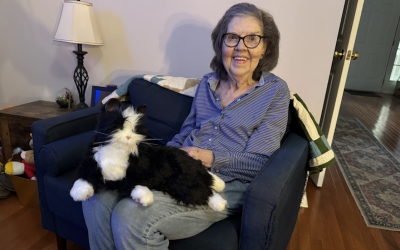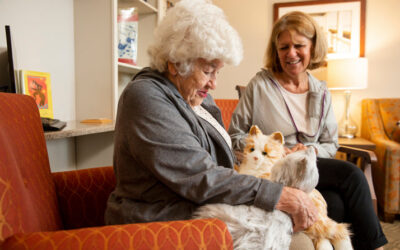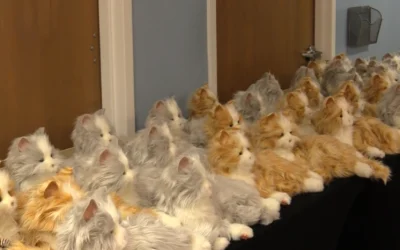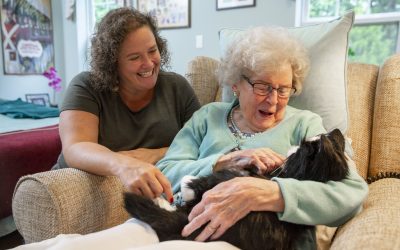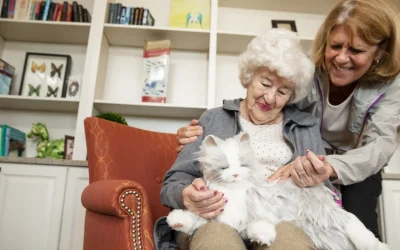View All
Announcements
Featured
Press
Research
Who is Caring for Our Nation’s Caregivers?
By Ted Fischer, Co-Founder and CEO of Ageless Innovation This year, the National Alliance for Caregiving and AARP released a landmark report on family caregiving in the United States, revealing over 63 million Americans are caregivers– nearly one in four adults is now...
At 88, she thought she was done with pets — then came this robot cat
For millions of older adults, loneliness is an ongoing crisis, posing serious repercussions for mental and physical health. Spending time with cats and dogs can go a long way towards easing loneliness, but for aging adults, people with memory loss, or those living...
Chandler-area group donates robotic pets for VA dementia patients
A yearly budget has been set aside to purchase robotic pets, which are specifically designed for use by Recreation Therapists in the hospital when working with dementia patients.
Why is caregiving so hard in America?
Many people caring for a sick or elderly relative are shocked to find out that Medicare does not cover the cost of a nursing home or subsidize care at home — the cleaning, driving, and helping with meals and dressing that so many families take on. Private health...
Robotic pets bringing joy to Stirling care home residents
Robotic pets are bringing some joy to residents of a Stirling care home. Residents at HC-One Scotland’s Forthbank Care Home in Kildean, Stirling, have been experiencing heartwarming moments through the innovative form of companionship.
Pets found to deliver significant health benefits to the lonely
They also found that the presence of pets, whether real or robotic, helped participants’ subjective well-being. “I got a lot of pleasure out of the program, and Barney being there, of course, but I liked [the robotic pet] the best … I get very lonely here, so the...
Family donates 40 robotic therapy cats to East Providence assisted living facility
“Her cat brought her so much joy, and we just wanted to spread that joy,” McMichael said. The “Joy for All Companion Pets” were gifted to residents at the assisted living facility Wednesday. Those residents spent the afternoon coming up with names, picking out collars...
15 Games To Play for National Board Game Day
Families can play a new edition of Trivial Pursuit that features generation-specific trivia and personal trivia on easy-to-read cards. Split between six traditional categories, there are 1,500 questions for the Greatest Generation, Baby Boomers, Generation X,...
Joy for All Impact and Benefit by Ageless Innovation
The following white paper is a summary of over 10 research studies and the thematic results coalesced from them. Findings include reduced feelings of depression, isolation and loneliness; reduced use of medication; increased cognitive activity; increased feelings of...
Ageless Innovation Expands Healthcare Reach with Domestic and International Wins to Start 2025—And Welcomes a Powerhouse Healthcare Industry Leader to Its Board
Ageless Innovation begins 2025 with healthcare wins in the form of a major program with the National Health Service (NHS) in the UK, and rollout of State Health Agency awards in multiple states. As Ageless Innovation continues to grow the distribution of their Joy for...
Ageless Innovation Set to Debut New Age-Inclusive Game, YAHTZEE Slots, At Toy Fair New York 2025
Just in time for Toy Fair New York 2025, Ageless Innovation, a global healthcare company devoted to reimagining how we positively live and age together through the power of play, will debut YAHTZEE Slots, the fifth age-inclusive game created under license from leading...
Ageless Innovation CEO and Co-Founder will take the stage at CES 2025
Ageless Innovation, a global company devoted to reimagining how we positively live and age together through the power of play, is proud to announce its debut exhibitor appearance at CES 2025, the world's most influential tech event.
Hasbro Taps Aging Experts at Ageless Innovation to Create an Age-Inclusive Version of Iconic TABOO Game
Today, Ageless Innovation, a global company devoted to reimagining how we positively live and age together through the power of play, under license from leading toy and game company, Hasbro, has released an age-inclusive version of Hasbro's classic TABOO game.
Gameplay Shows Positive Impact on the Mental Health and Well-being of Older Adults
Driven by new research findings, Ageless Innovation continues Reach Out and Play campaign designed to positively impact the lives of older adults through togetherness and gameplay. In response to the ongoing loneliness epidemic, which continues to disproportionately...
Innovative Program for Veterans Aims to Combat Dementia and Feelings of Social Isolation and Loneliness by Distributing Animatronic Pets Nationwide
Capital Caring Health, part of the nation's largest not-for-profit advanced illness care and hospice provider—Chapters Health System, and Ageless Innovation, the makers of the award-winning Joy for All™ Companion Pets, are distributing companion pets to Veterans with...
Ageless Innovation Announces The Continuation of Impactful “Reach Out and Play” Program in 2024
The campaign, which launched in September 2023, was designed to tackle the harmful effects of the ongoing loneliness epidemic by organizing hundreds of game night events for older adults and their families year-round. AARP, the nation's largest non-profit organization...
Ageless Innovation Names Chief Marketing Officer, Appoints New Hires to Mark Milestone Year and Expand Team of Aging Experts
The company at the forefront of delivering fun, joy, play and comfort to the older adult market punctuates hallmark year by naming co-founder Meghan Gamboa as Chief Marketing Officer, and announcing the hires of Celica Costantino, Vice President of Retail,...
NEW RESEARCH REVEALS ONE-THIRD OF ADULTS 50-PLUS (32%) OFTEN OR ALWAYS FEEL LONELY OR ISOLATED
To combat this concerning trend, Ageless Innovation, a global company devoted to reimagining how we positively live and age together through the power of play, created the Reach Out and Play initiative. Alongside AARP, hundreds of game-filled events will be organized...
Who is Caring for Our Nation’s Caregivers?
By Ted Fischer, Co-Founder and CEO of Ageless Innovation This year, the National Alliance for Caregiving and AARP released a landmark report on family caregiving in the United States, revealing over 63 million Americans are caregivers– nearly one in four adults is now...
At 88, she thought she was done with pets — then came this robot cat
For millions of older adults, loneliness is an ongoing crisis, posing serious repercussions for mental and physical health. Spending time with cats and dogs can go a long way towards easing loneliness, but for aging adults, people with memory loss, or those living...
Chandler-area group donates robotic pets for VA dementia patients
A yearly budget has been set aside to purchase robotic pets, which are specifically designed for use by Recreation Therapists in the hospital when working with dementia patients.
Why is caregiving so hard in America?
Many people caring for a sick or elderly relative are shocked to find out that Medicare does not cover the cost of a nursing home or subsidize care at home — the cleaning, driving, and helping with meals and dressing that so many families take on. Private health...
Robotic pets bringing joy to Stirling care home residents
Robotic pets are bringing some joy to residents of a Stirling care home. Residents at HC-One Scotland’s Forthbank Care Home in Kildean, Stirling, have been experiencing heartwarming moments through the innovative form of companionship.
Pets found to deliver significant health benefits to the lonely
They also found that the presence of pets, whether real or robotic, helped participants’ subjective well-being. “I got a lot of pleasure out of the program, and Barney being there, of course, but I liked [the robotic pet] the best … I get very lonely here, so the...
Family donates 40 robotic therapy cats to East Providence assisted living facility
“Her cat brought her so much joy, and we just wanted to spread that joy,” McMichael said. The “Joy for All Companion Pets” were gifted to residents at the assisted living facility Wednesday. Those residents spent the afternoon coming up with names, picking out collars...
15 Games To Play for National Board Game Day
Families can play a new edition of Trivial Pursuit that features generation-specific trivia and personal trivia on easy-to-read cards. Split between six traditional categories, there are 1,500 questions for the Greatest Generation, Baby Boomers, Generation X,...
Joy for All Impact and Benefit by Ageless Innovation
The following white paper is a summary of over 10 research studies and the thematic results coalesced from them. Findings include reduced feelings of depression, isolation and loneliness; reduced use of medication; increased cognitive activity; increased feelings of...
Joy for All Impact and Benefit by Ageless Innovation
The following white paper is a summary of over 10 research studies and the thematic results coalesced from them. Findings include reduced feelings of depression, isolation and loneliness; reduced use of medication; increased cognitive activity; increased feelings of...
Robotic Pets Can Dramatically Improve The Lives Of Older Adults With Dementia And Depression
As millions of older adults across the United States continue to experience loneliness and social isolation, non-profit organizations like Capital Caring Health in Washington, D.C. are turning to robotic pets as a low-cost, high-impact solution. Over the past 4 years,...
For America’s lonely seniors, robot pets are more than a novelty
Technology is often viewed as a contributor to our culture's epidemic of loneliness and isolation, but one company is trying to prove the opposite. Ageless Innovation's meowing "cats," wagging "dogs," and chirping "birds" have lifted the spirits of many seniors, with...
D.C. is America’s loneliest city. Can 1,000 robotic pets help?
Some senior residents are receiving battery-powered cats and dogs thanks to a new program from three local nonprofit groups.
At 88, she thought she was done with pets — then came this robot cat
For millions of older adults, loneliness is an ongoing crisis, posing serious repercussions for mental and physical health. Spending time with cats and dogs can go a long way towards easing loneliness, but for aging adults, people with memory loss, or those living...
Chandler-area group donates robotic pets for VA dementia patients
A yearly budget has been set aside to purchase robotic pets, which are specifically designed for use by Recreation Therapists in the hospital when working with dementia patients.
Robotic pets bringing joy to Stirling care home residents
Robotic pets are bringing some joy to residents of a Stirling care home. Residents at HC-One Scotland’s Forthbank Care Home in Kildean, Stirling, have been experiencing heartwarming moments through the innovative form of companionship.
Family donates 40 robotic therapy cats to East Providence assisted living facility
“Her cat brought her so much joy, and we just wanted to spread that joy,” McMichael said. The “Joy for All Companion Pets” were gifted to residents at the assisted living facility Wednesday. Those residents spent the afternoon coming up with names, picking out collars...
15 Games To Play for National Board Game Day
Families can play a new edition of Trivial Pursuit that features generation-specific trivia and personal trivia on easy-to-read cards. Split between six traditional categories, there are 1,500 questions for the Greatest Generation, Baby Boomers, Generation X,...
Hottest Toy Trends – Yahtzee Slots
We're thrilled to have Yahtzee Slots featured in Today's "Hottest Toy Trends" line up! Aired on March 20, 2025 at 8:53 AM on WNBC-TV (New York, NY) New York, NY, United States
Add Jackpot Wins to Game Night with Ageless Innovation’s Yahtzee Slots
You can hit the slots without ever leaving the comforts of home with this reimagined, age-inclusive game from Ageless Innovation. Made in partnership with Hasbro, Yahtzee Slots takes the beloved classic and adds casino twists that are perfect for the next family game...
The BIG Toy Book — 2025 Edition
We're thrilled to be featured in 2025's The BIG Toy Book! See Yahtzee Slots in the "Shared Adventures, Heated Battles" section (page 200). You can also find Taboo Charades in the "You're Never Too Old to Play" section (page 227).
Robotic Pets Can Dramatically Improve The Lives Of Older Adults With Dementia And Depression
As millions of older adults across the United States continue to experience loneliness and social isolation, non-profit organizations like Capital Caring Health in Washington, D.C. are turning to robotic pets as a low-cost, high-impact solution. Over the past 4 years,...
Pets found to deliver significant health benefits to the lonely
They also found that the presence of pets, whether real or robotic, helped participants’ subjective well-being. “I got a lot of pleasure out of the program, and Barney being there, of course, but I liked [the robotic pet] the best … I get very lonely here, so the...
Joy for All Impact and Benefit by Ageless Innovation
The following white paper is a summary of over 10 research studies and the thematic results coalesced from them. Findings include reduced feelings of depression, isolation and loneliness; reduced use of medication; increased cognitive activity; increased feelings of...
Older age, depression, loneliness all contribute to significant risk for dementia, cognitive decline
Older age, the onset of depression and increased loneliness can significantly contribute to the risk of dementia and cognitive decline, according to two separate studies.
Loneliness, social isolation, living alone are ‘significant’ risk factors for older adult mortality, study finds
Loneliness, social isolation and living alone are significant risk factors for mortality, particularly in older adults, according to the results of a new study. Researchers from Greece, Italy and Canada analyzed 86 previous studies to quantify the relationships...
Effects of a robotic cat on agitation and quality of life in individuals with dementia in a long-term care facility
Read the study Abstract Study Objective The purpose of this study is to determine whether introducing a robotic companion cat into a long term care facility may improve affect and, subsequently, increase participation for residents with dementia, and to determine...
The Impact of Robotic Companion Pets on Depression and Loneliness for Older Adults with Dementia During the COVID-19 Pandemic
Abstract Purpose Differences in depression and loneliness, during the COVID-19 pandemic, for older adults with mild to moderate dementia living in residential care after interacting with a robotic companion dog or cat were explored. Experiences of family members and...
Implementing Affordable Socially Assistive Pet Robots in Care Homes Before and During the COVID-19 Pandemic: Stratified Cluster Randomized Controlled Trial and Mixed Methods Study
Abstract Background Robot pets may assist in the challenges of supporting an aging population with growing dementia prevalence. Prior work has focused on the impacts of the robot seal Paro on older adult well-being, but recent studies have suggested the good...
Using Robotic Pets to Improve Interactions, Behaviors, and Quality of Life, While Reducing Anti-psychotics in Hospice Dementia Patients
Categories Reduce Social Isolation Reduce Feelings of Loneliness Reduce Use of Antipsychotics and other Medications Increased Quality of Life Others: Decreased Agitation; Increased Cooperation with Activities of Daily Living Organization Name Alacare Home Health and...
User-Centered Design of Companion Robot Pets Involving Care Home Resident-Robot Interactions and Focus Groups With Residents, Staff, and Family: Qualitative Study
Abstract Background Globally, pressure is increasing on health and social care resources due to the aging population and growing prevalence of dementia. Companion robots, such as Paro, demonstrate strong potential for helping reduce this pressure through reported...
LEARN MORE



